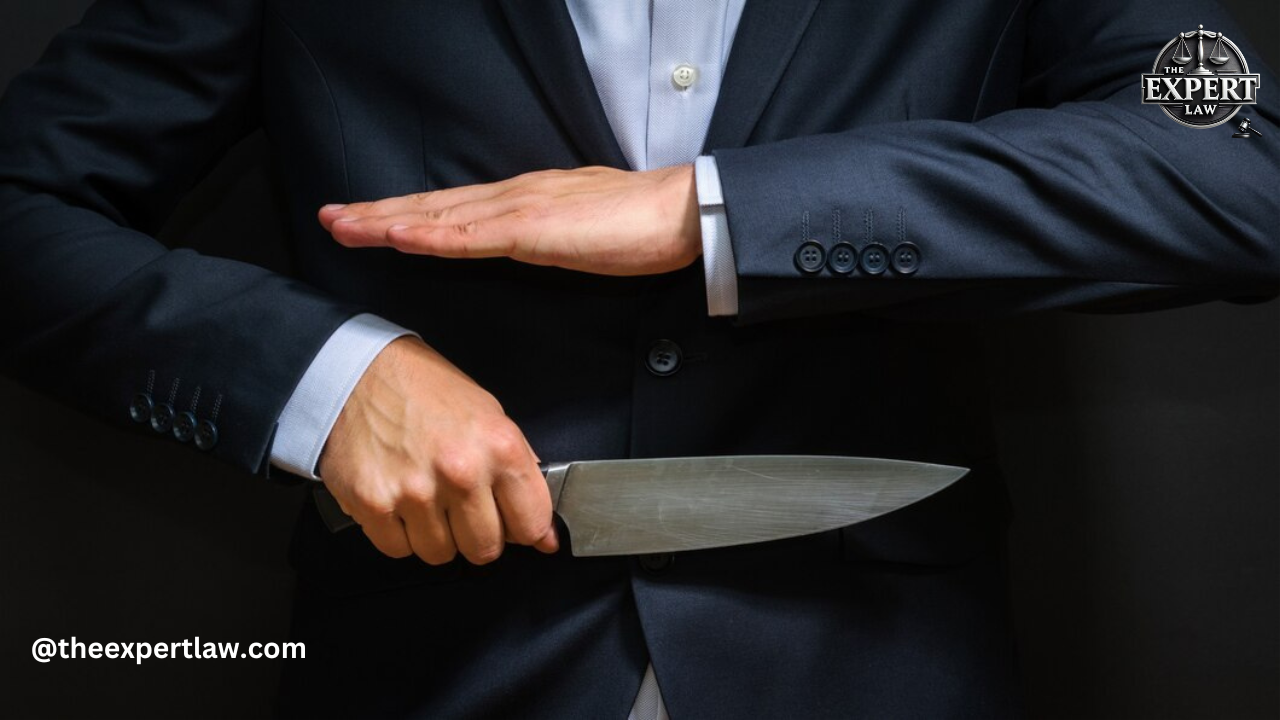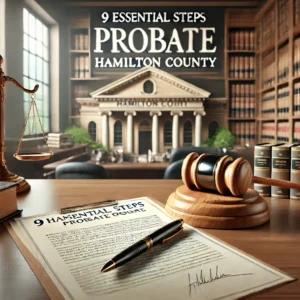Introduction
Probation can feel like a fresh start, offering a chance to rebuild your life while staying within the law. But it’s not without its challenges. Probation is a legal arrangement where you serve your sentence outside of jail, under strict rules and conditions. These rules are designed to help you reintegrate into society while maintaining accountability for your actions.
A question that often arises is: “Can you carry a knife while on probation?” It’s a valid concern, especially if carrying a knife is part of your daily life—whether for work, personal safety, or other practical reasons. However, the answer isn’t always straightforward. It depends on the terms of your probation, local laws, and the type of knife in question.
Understanding the restrictions you must follow while on probation is crucial. Violating these rules, even unintentionally, can lead to severe consequences like extended probation, fines, or even imprisonment. This guide will walk you through everything you need to know about the legality of carrying a knife while on probation, ensuring you stay informed and compliant with the law.
What Is Probation?
Probation is a legal agreement that allows you to avoid jail time under specific conditions set by the court. It’s an opportunity to prove you can live responsibly in the community while following the law. Instead of serving your sentence behind bars, you serve it in the real world—but with close supervision.
Definition of Probation in Legal Terms
Probation is a court-ordered period of supervision given as an alternative to incarceration. It’s a legal deal: you stay out of jail, but you must follow strict rules. A probation officer monitors your behavior to ensure compliance with the terms set by the court.
Common Conditions and Restrictions During Probation
Probation isn’t just about staying out of trouble—it comes with rules. Some of the most common conditions include:
- Regular Check-Ins: You’re required to meet with your probation officer, often weekly or monthly.
- No Criminal Activity: Breaking the law is a direct violation of your probation terms.
- Restricted Possessions: Carrying weapons, including knives, is often prohibited.
- Drug and Alcohol Tests: Regular screenings to ensure sobriety may be required.
- Travel Restrictions: You may need permission to leave your city, state, or even home at certain times.
Violating any of these conditions can lead to serious consequences, including jail time or extended probation.
Purpose of Probation and How It Differs From Parole
The primary purpose of probation is to give you a second chance to live responsibly while being supervised. It’s designed to rehabilitate and reintegrate individuals into society, offering support while holding them accountable.
Probation vs. Parole:
- Probation is given instead of jail time.
- Parole comes after serving part of a jail or prison sentence, allowing early release under strict rules.
Both involve monitoring, but probation is often seen as a preventative step, while parole is a transition after incarceration.
Are There General Restrictions on Carrying Weapons During Probation?
When you’re on probation, one of the most common and strict rules involves restrictions on carrying weapons. This includes guns, knives, and other objects that could be classified as dangerous. Let’s break this down to understand why these rules exist, how they vary, and what you need to know to stay compliant.
Common Probation Conditions Related to Weapons, Including Knives
Most probation agreements include clauses that prohibit possession or use of weapons. These conditions are designed to minimize the risk of violence or criminal activity.
- Knives and Sharp Objects: While everyday items like kitchen knives might not always be restricted, carrying knives in public or for self-defense purposes could violate your probation terms.
- Firearms: Probation often comes with a complete ban on owning or handling guns.
- Other Weapons: Items like tasers, brass knuckles, or even tools like crowbars may be restricted if deemed dangerous.
Why Weapons Are Often Restricted for Probationers
The restrictions aren’t arbitrary—they serve a purpose.
- Public Safety: The court aims to reduce the potential for violence or harm.
- Lower Risk of Violations: With weapons out of the equation, the chances of escalating situations into legal issues decrease.
- Rehabilitation Focus: Probation is meant to help you reintegrate peacefully into society, and carrying weapons can send the wrong signal to law enforcement or others.
For example, even a harmless misunderstanding involving a knife could lead to a probation violation, which might bring severe consequences.
Variability in Rules Based on Jurisdiction
Rules about carrying weapons vary significantly depending on where you live.
- State Laws: In some states, carrying a small knife for work or utility might be acceptable, while others might classify it as a violation.
- Type of Knife: Everyday tools like pocket knives may be treated differently from larger hunting knives or switchblades.
- Individual Terms of Probation: Your specific probation agreement might have stricter or more lenient conditions depending on your offense and criminal history.
Legal Definitions of “Weapons” and How They Apply to Knives
Understanding the legal definition of a “weapon” is crucial if you’re on probation. The term “weapon” is broader than you might think and includes various objects depending on their purpose and use. Let’s dive into how knives fit into these classifications and which types may be restricted.
Overview of What Is Legally Considered a Weapon
A weapon is generally defined as any object designed, intended, or used to cause harm, injury, or death. While firearms are the most recognized weapons, other items can also fall under this category, including:
- Sharp objects (like knives, swords, or razors).
- Blunt instruments (like bats or hammers).
- Improvised tools that can be used to harm others.
Even an object not designed as a weapon can be classified as one if used in a threatening manner. This means that something as simple as a pocketknife might be considered a weapon depending on the context.
How Knives Fit Into Weapon Classifications
Knives, though commonly used as tools, are often treated as weapons in the eyes of the law. The distinction usually depends on:
- Purpose: A kitchen knife used for cooking is generally not seen as a weapon unless carried in public or used threateningly.
- Design: Certain knives, like switchblades or butterfly knives, are more likely to be classified as weapons due to their association with violence.
- Context: Carrying a knife for work-related purposes (like a utility knife for construction) may be acceptable, while carrying the same knife without justification might not.
In the context of probation, even possession of a knife for seemingly harmless reasons can lead to legal trouble if it’s deemed a violation of your terms.
Types of Knives That May Be Restricted
Some knives are more likely to be considered dangerous or unlawful than others. Here’s a list of knives that are commonly restricted:
- Switchblades: Automatic knives that open with the press of a button.
- Butterfly Knives: Also known as balisongs, these knives have a folding, flipping design often linked to self-defense or combat.
- Hunting Knives: Large, fixed-blade knives designed for outdoor activities but considered weapons in many situations.
- Daggers or Double-Edged Knives: Knives with blades sharpened on both sides are often prohibited due to their combat-oriented design.
- Knives Exceeding a Certain Length: Many jurisdictions limit the blade length for knives carried in public, often to around 2.5–4 inches.
Can You Carry a Knife While on Probation?
Carrying a knife while on probation is a complex question that depends on multiple factors. Probation is meant to help you reintegrate into society, but it comes with strict rules to ensure accountability and safety. Let’s explore the circumstances under which carrying a knife might be allowed or prohibited.
Factors That Influence Whether Carrying a Knife Is Allowed
Whether you can carry a knife during probation depends on several factors:
- Type of Offense: If your probation is related to a violent crime or an offense involving weapons, you’re more likely to face strict bans on carrying knives.
- Type of Knife: Small utility knives, like pocketknives, may be less problematic than large hunting knives or switchblades.
- Purpose: The reason for carrying a knife matters. For instance, using a knife for work (e.g., as a chef or in construction) might be justifiable, while carrying it for personal protection could be seen as a violation.
- Jurisdiction: Local and state laws play a significant role in determining what’s allowed. Some areas have lenient knife laws, while others are highly restrictive.
- Probation Officer’s Discretion: Your probation officer has a say in interpreting and enforcing the rules of your probation. Always clarify any doubts directly with them.
Role of Specific Probation Terms in Determining Knife Possession Legality
The specific terms of your probation agreement are critical in determining whether carrying a knife is permissible.
- Explicit Prohibitions: Many probation agreements explicitly ban weapons, including knives. In such cases, carrying a knife would be a direct violation.
- Work-Related Exceptions: If carrying a knife is essential for your job, you might be able to request an exception or approval. However, this typically requires documentation and the approval of your probation officer.
- Case-by-Case Evaluation: Some probation agreements don’t mention knives explicitly. In these situations, it’s important to seek clarification to avoid unintentionally breaking the rules.
Real-Life Examples of Cases Where Knife Possession Was Allowed or Prohibited
- Allowed for Work:
- A chef on probation was permitted to use kitchen knives at work but was prohibited from carrying them outside the workplace.
- A construction worker was allowed to carry a utility knife but had to keep it stored in a toolbox when not in use.
- Prohibited Due to Context:
- A probationer carrying a pocketknife for personal protection was charged with violating probation because the knife wasn’t necessary for work or daily living.
- A hunting enthusiast violated probation by carrying a large hunting knife on a camping trip without prior approval, despite local laws allowing the knife for outdoor activities.
Jurisdictional Differences in Knife Laws
Knife laws vary widely across states and countries, creating a confusing legal landscape for anyone, especially those on probation. Understanding how these differences impact the legality of carrying knives is essential to ensure compliance and avoid unintended legal troubles.
How State or Country-Specific Laws Affect the Legality of Carrying Knives
Each state or country has its own set of rules for defining what constitutes a legal knife. While some places allow the possession of knives with few restrictions, others impose strict rules, particularly regarding:
- Blade Length: Some jurisdictions limit blade length, often to under 3–4 inches, especially for concealed knives.
- Type of Knife: Knives like switchblades, butterfly knives, or daggers are banned in many areas.
- Intent to Carry: Carrying a knife for self-defense may be considered illegal in jurisdictions where knives are classified strictly as tools.
When on probation, these laws apply alongside your probation terms. Violating state or local knife laws could result in legal penalties or a probation violation.
Examples of Lenient vs. Strict Jurisdictions
- Lenient Jurisdictions:
- Texas: Allows carrying large knives, including bowie knives, as long as they aren’t brought into restricted areas like schools or courthouses.
- Utah: Generally has no blade length restrictions, and concealed knives are permitted.
- Strict Jurisdictions:
- California: Limits blade length for concealed knives to 2.5 inches in many public spaces and bans switchblades with blades over 2 inches.
- New York: Prohibits gravity knives and considers intent a critical factor, which could make even small knives illegal if used threateningly.
These examples highlight the importance of understanding local laws, as what’s permissible in one area may be illegal in another.
Importance of Consulting a Probation Officer or Legal Counsel About Local Laws
Navigating probation and local knife laws simultaneously can be tricky. Here’s why consulting your probation officer or legal counsel is critical:
- Clarity on Rules: They can clarify how local laws apply to your probation conditions.
- Avoiding Violations: Seeking guidance ensures you don’t unknowingly breach your probation by carrying an illegal knife.
- Requesting Exceptions: If you need to carry a knife for work or other legitimate reasons, they can help you file for exceptions or approvals.
Exceptions to the Rule
While carrying a knife during probation is generally prohibited, there are certain exceptions where it may be permitted. These exceptions often depend on the reason for carrying the knife, the type of knife, and approval from your probation officer or the court. Let’s explore these scenarios and how you can navigate them.
Situations Where Carrying a Knife Might Be Permitted
Carrying a knife isn’t always outright forbidden, especially when it serves a legitimate, non-threatening purpose. Some common situations where exceptions might apply include:
- Work-Related Needs: Jobs like chefs, construction workers, or landscapers often require knives or cutting tools as part of their daily responsibilities.
- Educational or Recreational Activities: Carrying knives for specific classes (e.g., culinary school) or hobbies (e.g., camping, fishing) may be allowed under certain conditions.
- Cultural or Religious Practices: Some individuals carry knives as part of cultural or religious traditions (e.g., kirpans in Sikhism).
Even in these situations, the key is demonstrating that the knife is essential and will be used responsibly.
How to Obtain Special Permissions or Waivers for Carrying a Knife During Probation
If you believe you need to carry a knife for a legitimate reason, follow these steps to seek approval:
- Discuss with Your Probation Officer:
- Explain why you need to carry a knife and provide evidence (e.g., proof of employment or enrollment in a relevant course).
- Be clear and honest about your intentions.
- Provide Documentation:
- Obtain a letter from your employer or organization explaining the necessity of the knife.
- Include details like the type of knife and how it will be used.
- Request a Written Waiver:
- Ask your probation officer or the court for written permission to carry the knife.
- Keep a copy of this document with you at all times when carrying the knife.
- Adhere to Conditions:
- Follow any specific rules attached to the waiver, such as only carrying the knife in certain locations or during work hours.
Examples of Lawful Reasons for Carrying a Knife
Here are examples where carrying a knife might be legally permitted during probation:
- Kitchen Work: A professional chef may need to carry a set of kitchen knives to their workplace.
- Outdoor Survival Activities: Someone participating in supervised camping trips or outdoor programs may require knives for survival purposes.
- Construction or Handyman Jobs: Utility knives are often essential for cutting materials like drywall, ropes, or boxes.
9 Essential Steps and Expert Tips for Navigating Hamilton County Probate
Consequences of Violating Probation by Carrying a Knife
Carrying a knife while on probation without proper authorization can have serious repercussions. Probation is your opportunity to avoid jail time, but violations—whether intentional or accidental—can quickly turn your life upside down. Understanding the penalties and long-term consequences is essential to stay compliant.
Potential Penalties for Violating Probation Conditions
Breaking the terms of your probation, such as carrying a knife without permission, is considered a probation violation. The penalties depend on the severity of the violation and your jurisdiction, and can include:
- Formal Warnings: For minor infractions, you might receive a warning from your probation officer.
- Increased Monitoring: Your probation officer may impose stricter supervision, including more frequent check-ins or home visits.
- Fines: Courts may order you to pay additional fines as punishment for the violation.
How a Violation Could Extend Probation or Result in Jail Time
In more serious cases, probation violations can result in significant consequences, such as:
- Probation Extension: The court may extend the length of your probation period, adding months or even years to your sentence.
- Revocation of Probation: If the violation is severe, the court may revoke your probation entirely, requiring you to serve your original sentence in jail.
- Additional Charges: Carrying a knife unlawfully could lead to new criminal charges, compounding your legal troubles.
For example, if your probation terms explicitly prohibit weapons, being caught with a knife—even one legally permissible for the general public—could lead to immediate arrest and a court hearing.
Long-Term Impacts on Criminal Records and Future Probation Terms
Violating probation leaves a lasting mark on your criminal record. The long-term consequences may include:
- Increased Difficulty in Future Cases: If you face legal issues again, past violations will likely lead to harsher penalties and stricter probation terms.
- Challenges in Employment: Employers who conduct background checks may view probation violations as a sign of unreliability or risk.
- Loss of Trust from Legal Authorities: Violating probation can damage your relationship with probation officers and courts, making it harder to request leniency or exceptions in the future.
Steps to Ensure Compliance with Probation Conditions
Staying compliant with probation conditions is crucial for completing your probation successfully. By understanding the rules, communicating effectively, and seeking clarification when needed, you can avoid violations and stay on track. Here’s a practical guide to help you navigate your probation smoothly.
How to Review Your Probation Terms Thoroughly
The first step to compliance is understanding what’s expected of you.
- Read All Documents Carefully:
- When your probation begins, you’ll receive a detailed document outlining the conditions. Read it thoroughly and take note of any mentions of weapons or knives.
- Highlight Key Points:
- Mark the sections that apply directly to your daily life, such as restrictions on travel, curfew, or possession of specific items.
- Ask for a Simplified Explanation:
- If the language in the documents is confusing, ask your probation officer to explain it in simpler terms.
Importance of Maintaining Open Communication with Your Probation Officer
Your probation officer is your primary point of contact and can provide clarity on any uncertainties.
- Regular Check-Ins: Ensure you attend all scheduled meetings and provide updates on your activities.
- Discuss Any Concerns: If you’re unsure whether carrying a knife for work or daily tasks is allowed, talk to your officer before taking action.
- Notify About Changes: If your circumstances change (e.g., new job requiring a utility knife), inform your probation officer immediately.
Seeking Clarification or Legal Advice If Unsure About Specific Restrictions
Sometimes, the rules might not be entirely clear, or you might face situations where you’re unsure about compliance. In these cases:
- Consult Legal Counsel:
- A lawyer familiar with probation laws can provide expert advice tailored to your situation.
- Ask Specific Questions:
- Avoid assumptions. For example, ask, “Is it okay to carry a pocketknife for my job?” instead of guessing.
- Research Local Laws:
- Understanding your state or local laws on knives can help you make informed decisions.
Practical Steps to Stay Compliant:
- Keep a list of your probation conditions handy.
- Set reminders for key probation deadlines (e.g., check-ins or court appearances).
- Document any approvals or permissions granted by your probation officer in writing.
What to Do If You Are Accused of Violating Probation
Facing an accusation of violating probation, especially for carrying a knife, can be stressful and overwhelming. However, acting quickly and strategically can make a significant difference in the outcome. Here’s how to handle the situation if you’re accused of breaking your probation terms.
Immediate Actions to Take If Accused of Carrying a Knife
When you’re accused, the first steps you take are critical.
- Stay Calm and Composed:
- Avoid arguing or making statements that could be used against you. Anything you say may be recorded or reported to the court.
- Contact Your Probation Officer:
- Inform them of your side of the story, but stick to the facts. If you had a legitimate reason for carrying the knife (e.g., for work), explain it briefly.
- Gather Evidence:
- Collect any documents or proof that justify why you were carrying the knife, such as:
- Work ID or employment letters.
- Approval or waiver documents.
- Photos showing the context of the knife’s use.
- Collect any documents or proof that justify why you were carrying the knife, such as:
- Document the Incident:
- Write down everything that happened, including dates, times, and any witnesses who can corroborate your account.
Importance of Securing Legal Representation
An experienced attorney can be your greatest ally if you’re accused of violating probation.
- Legal Guidance:
- A lawyer can review your probation terms, the specifics of the accusation, and any evidence against you to build a strong defense.
- Representation in Court:
- Your attorney will advocate on your behalf during a probation hearing or legal proceedings, ensuring your rights are protected.
- Negotiating with the Court:
- If a violation did occur, your lawyer can negotiate for reduced penalties, such as avoiding jail time or further restrictions.
Preparing for a Probation Hearing or Legal Proceedings
If your case goes to a probation hearing, being prepared can help you achieve the best possible outcome.
- Understand the Allegations:
- Review the specifics of the accusation, including how the alleged violation occurred.
- Provide Evidence of Compliance:
- Show proof that you’ve been following other probation conditions diligently, such as attending meetings or completing required programs.
- Character References:
- Gather statements from employers, family, or community members who can vouch for your character and commitment to rehabilitation.
- Be Honest and Respectful:
- In court or during hearings, acknowledge any mistakes but emphasize your willingness to comply moving forward.
FAQs About Carrying Knives While on Probation
Can I Carry a Knife for Work Purposes?
Yes, in some cases, you may be allowed to carry a knife for legitimate work purposes, but only with proper authorization.
- Steps to Take:
- Discuss your need with your probation officer.
- Provide evidence, such as an employment letter or proof that the knife is essential for your job.
- Request written permission or a waiver to carry the knife during work hours.
- Important Note: Even if approved, carrying the knife outside of work-related settings may still violate your probation terms.
Is Carrying a Pocketknife Considered a Violation?
This depends on your probation terms and local laws.
- When It Might Be Allowed:
- If the pocketknife is small (e.g., blade length under 3 inches) and used for practical tasks like opening packages.
- If your probation agreement doesn’t explicitly prohibit knives or weapons.
- When It’s a Violation:
- If your probation terms include a blanket ban on weapons, regardless of size or intent.
- If the pocketknife is carried in a public or restricted area where knives are illegal.
Action to Take: Clarify with your probation officer whether carrying a pocketknife is acceptable to avoid accidental violations.
How Can I Check If a Specific Knife Is Restricted Under Probation?
To confirm whether a particular knife is allowed:
- Review Your Probation Terms:
- Check for specific mentions of weapons, knives, or blade restrictions.
- Research Local Laws:
- Some states or jurisdictions restrict certain knives (e.g., switchblades or knives exceeding a certain blade length).
- Look up laws in your area or consult a legal advisor for accurate information.
- Ask Your Probation Officer:
- Provide details about the knife (type, blade length, intended use) and ask for written clarification or approval.
Conclusion
Probation is a second chance, but it comes with responsibilities that must be taken seriously. Whether you can carry a knife while on probation depends on various factors, including your specific probation terms, local laws, and the knife’s purpose. Understanding these details is crucial to staying compliant and avoiding unnecessary legal trouble.
Carrying a knife, even for practical reasons like work or outdoor activities, requires careful consideration. By thoroughly reviewing your probation conditions, consulting with your probation officer, and seeking legal advice when needed, you can ensure that your actions align with the rules. Ignorance of the law or your probation terms isn’t an excuse and could lead to severe consequences like extended probation or even incarceration.
Remember, success during probation relies on proactive communication and compliance. If you’re ever uncertain, take the extra step to clarify before acting. Completing probation without violations not only keeps you out of legal trouble but also sets the foundation for a better future.
You’ve got the tools to stay on track—use them wisely! If you need further guidance or support, don’t hesitate to reach out to legal professionals or your probation officer. Staying informed is your best defense.
Dive into the world of Legal Service with The Expert Law. Visit our website and unlock endless inspiration!





